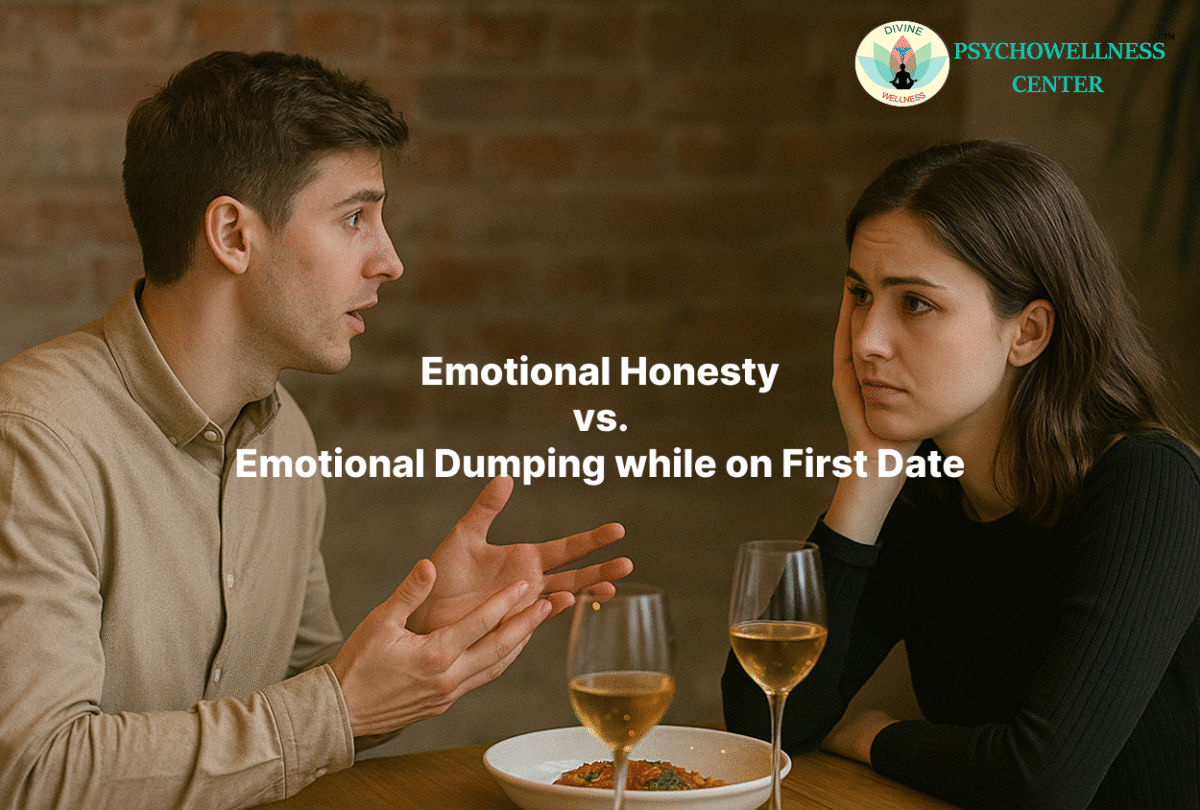Initial meetings can stir both excitement and anxiety. We want to make a good impression, connect deeply, and feel seen and heard. However, amid various emotions and intentions, a prevalent question frequently arises: to what extent should one express their feelings on a first date?
There’s a fine line between being emotionally honest and emotionally overwhelming. While authenticity is vital for building genuine connections, oversharing can turn a promising conversation into an emotional minefield. Let’s unpack the difference between emotional honesty and emotional dumping, especially in the context of first dates.
What Is Emotional Honesty?
Emotional honesty means being open and authentic about your feelings, values, and experiences in a way that is respectful, self-aware, and appropriately paced. It’s about letting someone get to know the real you without hiding behind masks or pretending to be someone else.
On a first date, emotional honesty might look like:
- Sharing that you’re nervous because you’re genuinely interested in getting to know the other person.
- Discussing succinctly your principles or what you seek in a partnership.
- Being candid about what makes you feel happy, inspired, or fulfilled.
Emotional honesty invites connection. It permits the other person to be real, too. It is not a matter of achieving perfection, but rather of presenting oneself with integrity and self-respect.
What Is Emotional Dumping?
Emotional dumping is the excessive sharing of negative feelings without considering the listener’s readiness. It often comes from a place of anxiety or a deep desire to be understood, but it can feel overwhelming or inappropriate to the other person.
On a first date, emotional dumping might look like:
- Venting intensely about your ex, your family, your friends or life struggles without context or mutual space.
- Shifting the conversation to a therapy session-like tone, where one person unloads and the other just listens.
- Emotional dumping bypasses boundaries. It doesn’t allow space for mutual discovery because it’s too heavy, too fast.
Why the Difference Matters on a First Date
The first date is the beginning of a potential relationship—it’s about building curiosity, testing compatibility, and establishing mutual respect. While honesty fosters connection, emotional dumping can create discomfort, pressure, or a feeling of emotional burden before trust has had time to develop.
Imagine this:
You’re enjoying a coffee date and learning about each other’s favourite music and travel dreams. Suddenly, your date starts crying while recounting an abusive relationship or childhood trauma. While your empathy might be stirred, you also might feel overwhelmed, unsure of how to respond, and hesitant about continuing the date.
In contrast, if your date says, “I’ve been through a tough breakup in the past, and it taught me a lot about what I value in relationships,” that’s emotionally honest, grounded, and leaves room for mutual exploration.
Here are some guidelines for emotionally honest sharing on a first date:
- Start with the present: Talk about who you are now, what lights you up, and what you’re passionate about.
- Use the “skim the surface” method: Mention sensitive topics in a light or general way, allowing your date to show interest before going deeper.
- Pay attention to the flow: If the other person is also opening up gradually, it signals a safe space for mutual emotional depth.
- Don’t overshare to bond: True connection takes time. Revealing excessive information prematurely may alienate individuals.
- Stay attuned: Notice if your date looks confused, uncomfortable, or disengaged. That might mean the emotional content is too heavy for this stage.
Signs You Might Be Emotionally Dumping
- You feel the need to explain or justify your entire past.
- You talk for long stretches without checking in with the other person.
- You feel drained or exposed afterwards.
- You’re hoping for validation or emotional caretaking from someone you just met.
If this resonates, it’s okay. Emotional dumping often stems from a genuine desire for connection, especially if you’ve felt invalidated in past relationships. But it’s important to remember that vulnerability without boundaries is not intimacy—it’s exposure.
Conclusion
The purpose of a first date is not to share emotional burdens, but rather to establish an emotional connection. That means being real—but not reckless. Emotionally honest communication invites curiosity, warmth, and safety. It builds the foundation for a more meaningful relationship—one where deeper stories can unfold with time, trust, and mutual care.
So next time you go on a first date, bring your authentic self, but also bring a sense of pacing. Let the connection grow at a human speed. You don’t have to tell your whole story on day one. Just begin it.
If you’re struggling with setting emotional boundaries or building self-confidence, consider seeking support. Motivational interviewing and therapy can help you better understand your needs and communicate them effectively. You might want to take counselling from the best psychologist in Delhi NCR or simply search for a therapist near me to start your journey toward emotional clarity.
Contributed by Ms. Srishti Jain, Counselling Psychologist
This blog was posted on 24 June 2025
References
- Brown, B. (2012). Daring greatly: How the courage to be vulnerable transforms the way we live, love, parent, and lead. Gotham Books.
- Brown, B. (2015). Rising strong: How the ability to reset transforms the way we live, love, parent, and lead. Spiegel & Grau.
- Linehan, M. M. (2015). DBT skills training manual (2nd ed.). Guilford Press.
- Nelson, S. K. (2017). The art of showing up: How to be there for yourself and your people. TarcherPerigee.

